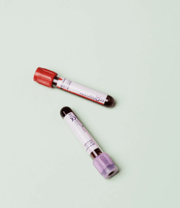A nutritionist warns against these popular snacks—they’re not as healthy as you think!
By
VanessaC
- Replies 7
Snacks are the perfect little pick-me-up between breakfast and lunch, a pre-workout energy boost, and a post-dinner treat.
But despite their popularity, one nutritionist issued a warning about particular snack options—ones that, sadly, do not offer any extra nutritional value.
Accredited Nutritionist and Dietitian Susie Burrell said that highly refined snack foods such as rice crackers, sweet biscuits, processed meat snack packs, and fruit bites offer little nutrition—and as such, they are best avoided.
'Ideally, a snack should always be a food that offers something positive nutritionally—this means that highly refined snack foods such as rice crackers, sweet biscuits, crackers and cheese dip, processed meat snack packs, and fruit bites that offer little other than refined carbohydrate, vegetable oil, and added sugars are best avoided altogether if the goal is to enjoy a tasty yet satisfying snack,' she said.
Throughout the day, there are different energy requirements, so below are Susie’s suggestions for snack options that suit some parts of the day better than others:
For mid-morning snacks, she recommends that members reach for 'good-quality carbohydrates for an energy boost, along with a little protein to keep glucose levels controlled'.
This could be a milk-based coffee with some fruit or cheese, a slice of protein toast with nut spread, or a protein-based wholegrain snack bar.
Mid-afternoon snacks, on the other hand, should be 'nutrient-dense vegetables and fruit along with a high protein choice'.
Think protein bar with a punnet of berries, a high-fruit yoghurt with nuts and fruit, or a few wholegrain crackers with cottage cheese and tomato.
And if it's late afternoon or after dinner treats you're looking for, Susie recommends 'low-calorie snacks' like vegetable-based dips, chopped vegetables, edamame, or popcorn. These can complement your dinner rather than derailing it.
But perhaps most importantly of all, Susie cautions us to remember to 'keep [late-night] calories controlled, [with] 100-200 [calories] at most'.
This could be a single biscuit, small portions of frozen yoghurt or ice cream, or a small glass of wine—all are tasty treats but also calorie-controlled!
And if you're a fan of the gym, according to Susie, pre-workout snacks should be 'a mix of good quality carbohydrate and a little protein will provide the glucose required to help fuel the muscles, while a small amount of protein will help to regulate glucose levels'.
Accordingly, one can enjoy options like protein shakes with banana, a slice of toast with nut spread or a slice of cheese, fruit yoghurt, or a protein-based or granola snack bar as long as they are consumed 60-90 minutes before working out.
 We highly recommend giving these healthier options a go! However, always check with your healthcare provider and/or your nutritionist if these alternatives fit your diet well.
We highly recommend giving these healthier options a go! However, always check with your healthcare provider and/or your nutritionist if these alternatives fit your diet well.
Sharing is caring, too—let us know your healthy snack alternatives in the comments below, dear members!
But despite their popularity, one nutritionist issued a warning about particular snack options—ones that, sadly, do not offer any extra nutritional value.
Accredited Nutritionist and Dietitian Susie Burrell said that highly refined snack foods such as rice crackers, sweet biscuits, processed meat snack packs, and fruit bites offer little nutrition—and as such, they are best avoided.
'Ideally, a snack should always be a food that offers something positive nutritionally—this means that highly refined snack foods such as rice crackers, sweet biscuits, crackers and cheese dip, processed meat snack packs, and fruit bites that offer little other than refined carbohydrate, vegetable oil, and added sugars are best avoided altogether if the goal is to enjoy a tasty yet satisfying snack,' she said.
Throughout the day, there are different energy requirements, so below are Susie’s suggestions for snack options that suit some parts of the day better than others:
For mid-morning snacks, she recommends that members reach for 'good-quality carbohydrates for an energy boost, along with a little protein to keep glucose levels controlled'.
This could be a milk-based coffee with some fruit or cheese, a slice of protein toast with nut spread, or a protein-based wholegrain snack bar.
Mid-afternoon snacks, on the other hand, should be 'nutrient-dense vegetables and fruit along with a high protein choice'.
Think protein bar with a punnet of berries, a high-fruit yoghurt with nuts and fruit, or a few wholegrain crackers with cottage cheese and tomato.
And if it's late afternoon or after dinner treats you're looking for, Susie recommends 'low-calorie snacks' like vegetable-based dips, chopped vegetables, edamame, or popcorn. These can complement your dinner rather than derailing it.
But perhaps most importantly of all, Susie cautions us to remember to 'keep [late-night] calories controlled, [with] 100-200 [calories] at most'.
This could be a single biscuit, small portions of frozen yoghurt or ice cream, or a small glass of wine—all are tasty treats but also calorie-controlled!
And if you're a fan of the gym, according to Susie, pre-workout snacks should be 'a mix of good quality carbohydrate and a little protein will provide the glucose required to help fuel the muscles, while a small amount of protein will help to regulate glucose levels'.
Accordingly, one can enjoy options like protein shakes with banana, a slice of toast with nut spread or a slice of cheese, fruit yoghurt, or a protein-based or granola snack bar as long as they are consumed 60-90 minutes before working out.
Key Takeaways
- A nutritionist has advised that highly refined snack foods, such as rice crackers and sweet biscuits, offer little nutrition and are best avoided.
- Different types of snacks are recommended for different times of the day, with nutrient-dense, high-protein options recommended for mid-afternoon to prevent sugar cravings and overeating before dinner.
- In the evening, it can help to have low-calorie snacks on hand to avoid consuming excess calories before dinner.
- For those who exercise, the nutritionist suggests a mix of good-quality carbohydrates and a little protein will provide the glucose required to help fuel the muscles if consumed 60-90 minutes before a workout.
Sharing is caring, too—let us know your healthy snack alternatives in the comments below, dear members!








